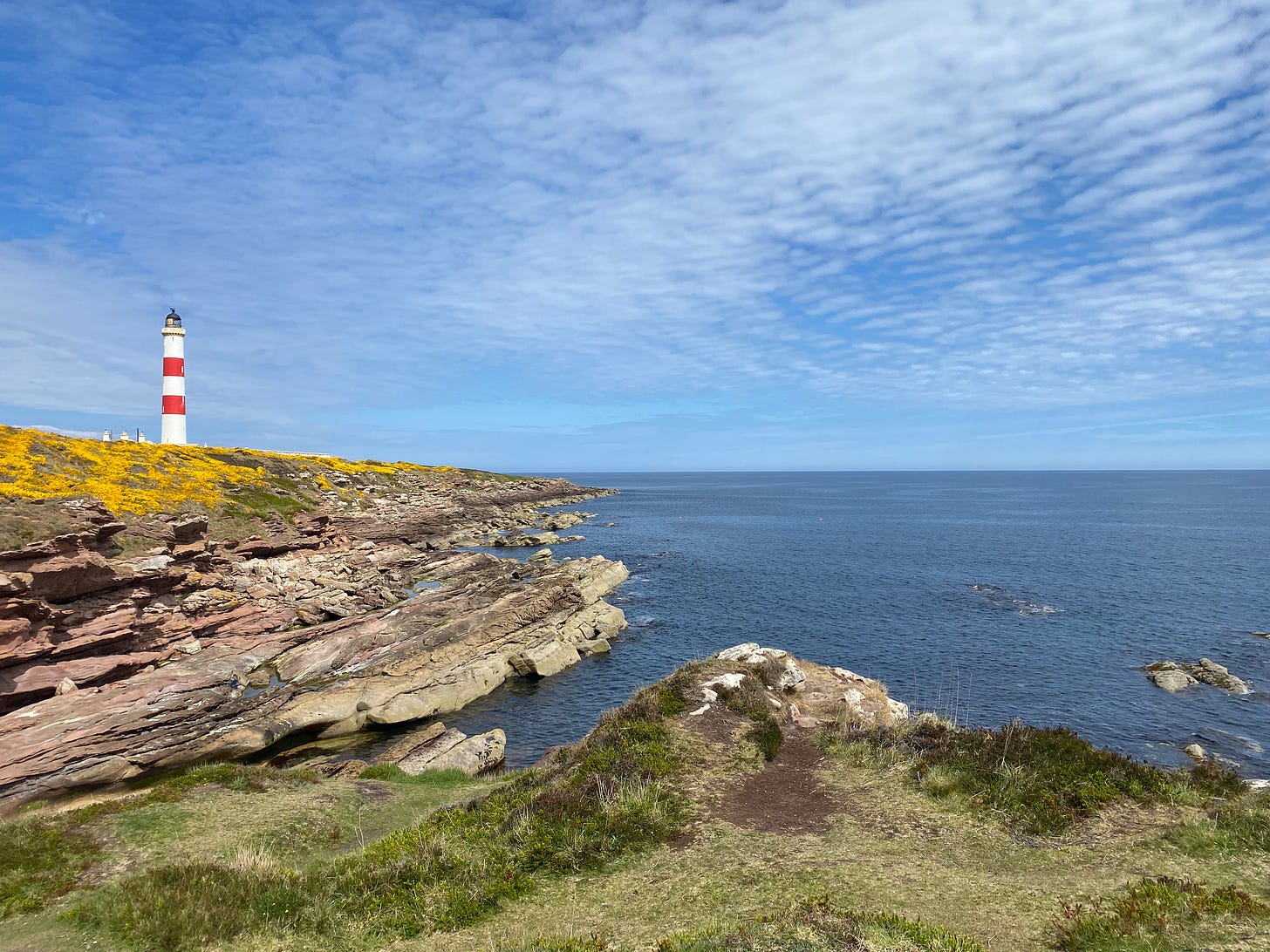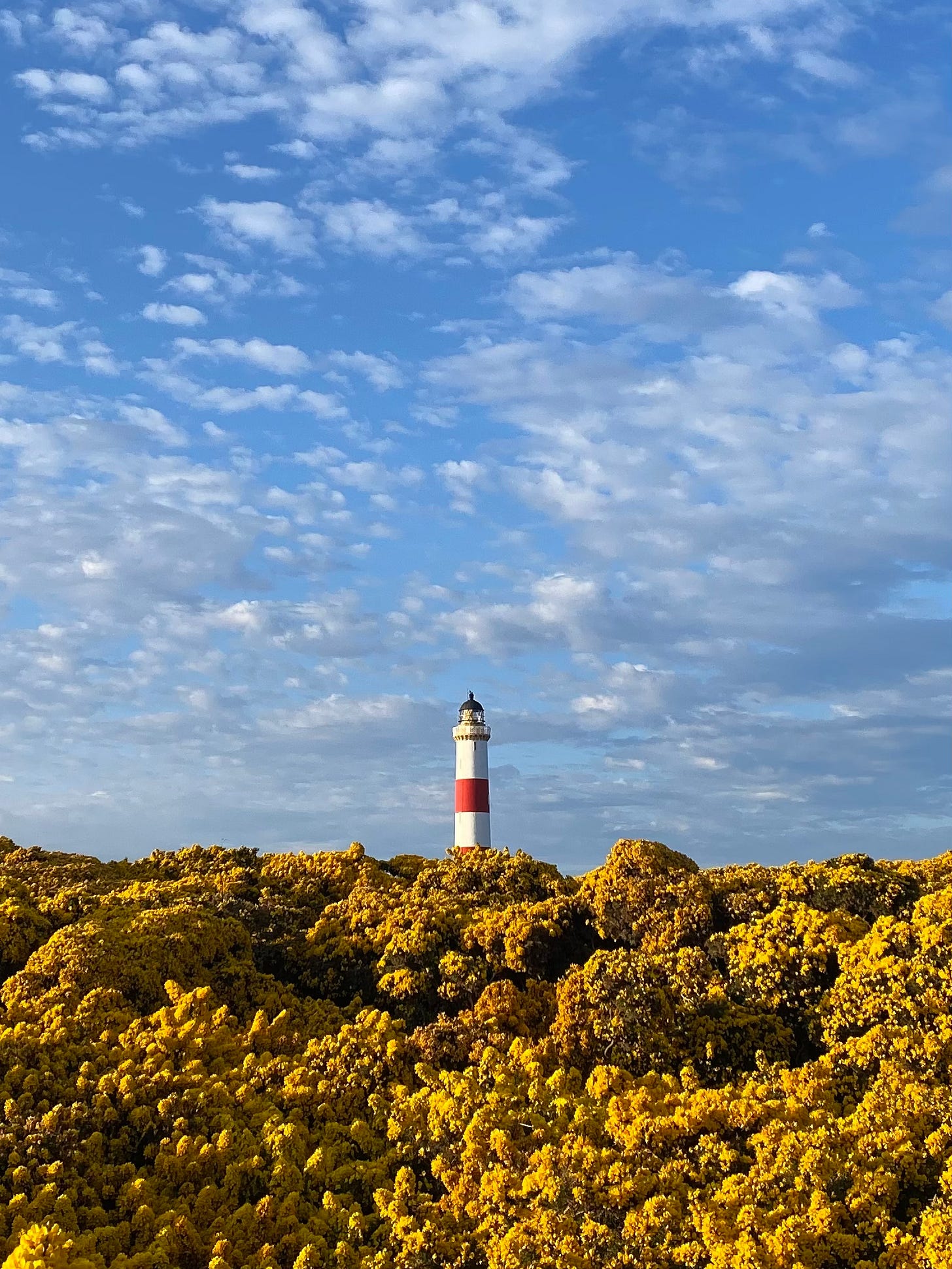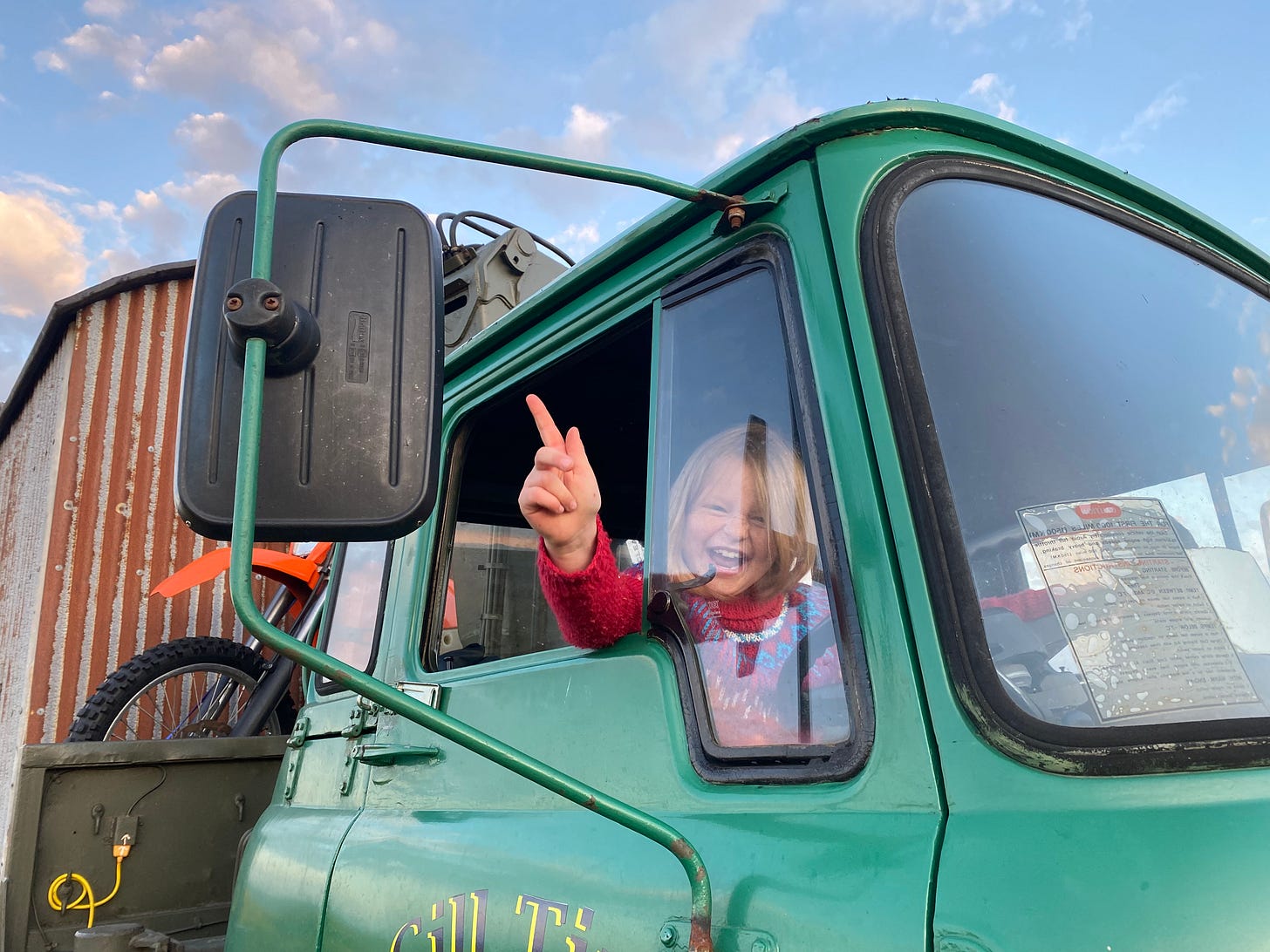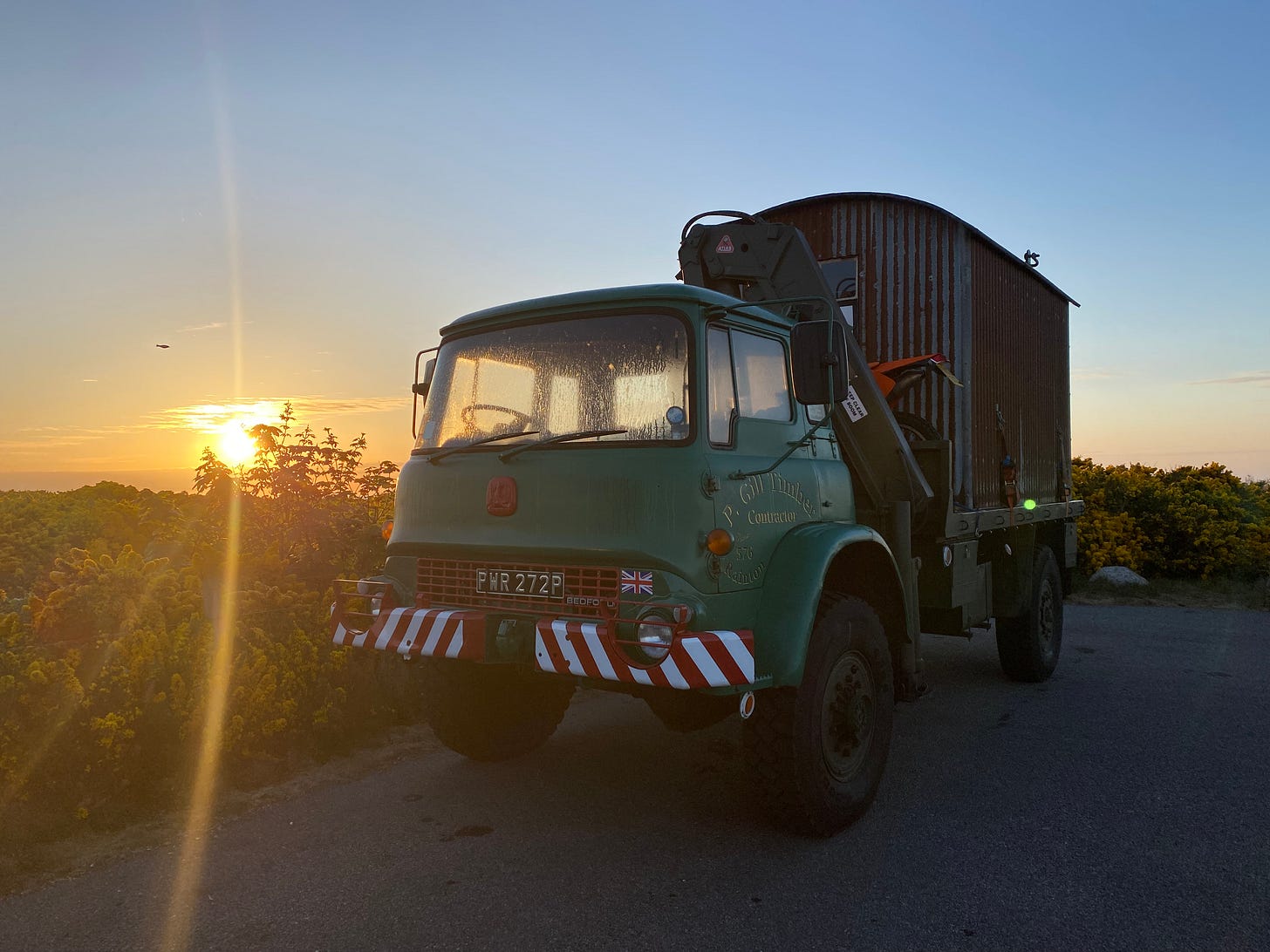Book of Travels: May
Working on the road, the Belgians invade, and a visit from Mr Pip.
Each month I share stories from a week of roving.
Monday 5th May
Black Loch, west coast, Scottish Highlands
Last night at Black Loch, somewhere on the west coast of Scotland, the wind dropped and the water became still under the light of the half moon. In the brilliant sky Mars, Pollux, and Jupiter, picked their way down the steep slope of the hillside, toward the cold clear depths.
This morning brings sunshine with a searching westerly wind. Tara is weeping. She is overwhelmed with work, chained to the laptop, many projects requiring attention all at once. Her graft brings in money while we are on the road - for this I am grateful. I earn a pittance for the work I do, and Tara makes up the deficit - because of this I am ashamed.
She takes on too much, trying to please people and fulfil their expectations to the highest degree. Crushed under the weight of it all, she will not unload the burden, determined as she is to see it through.
Deep in her psyche, something more painful is at work: the fear of existential annihilation and the insecurity of being coupled with an unreliable and untrustworthy man. In desperation, she prostrates herself at the feet of the false god security, offering herself as sacrifice.
‘I am security. I am your God.’1
I know I am failing my woman at a fundamental level. I have promised to provide and make safe, yet she is providing, not me.
As Hunter S. Thompson noted, no doubt to the dismay of many men:
‘If you don’t put bread on the table you’re a failure.’2
I could get paid work and release Tara from the pressure of earning, indeed, I must bring in more money, but the way I earn impacts heavily on the way of life we have forged over the past two years. Currently we enjoy wide-ranging movement from place to place, variety and wonder, immersion in nature, the elements, and the changing seasons, freedom from the tyranny of clock time, and a slow and gentle pace of life. We have close connection with our children, they receive a wild and radical education which includes story, history, myth, the natural world, foraging, folk music, firelighting, whittling, knitting, craft, poetry, politics, philosophy, classic literature, and self-understanding, amongst other things. All of this is made possible by the way we live, in opposition to the conventional norms.
On the other hand, I could get my head down and grind away at some sort of menial labour, like my great grandfathers did, but if I take work which binds me to a place, a whole host of pressures follow: we will need somewhere more permanent to live, I will have to absent myself to work the set hours, our freedom of movement is curtailed, nature becomes something to visit rather than reside in, the bulk of the work of raising and educating our children will fall to Tara, and since the ability of a household to live on the income of one working parent (usually the father) has been steadily eroded since the 1950s, Tara may have to take paid work anyway, which means the children could be handed over to the miserable conventional schooling system. I say this is a poor way of living.
Why can’t I get work that can be done remotely whilst we travel, like Tara? I have tried, half-heartedly, but I cannot sustain it. I have absented myself from the system3 for too long now and I am becoming unemployable in the conventional sense.
What remains is for me to make my own meaningful work and make it pay without undermining it - an almost impossible task. Who provides in the meantime? Tara does.
You might say I am deluded and feckless, that I need to get a grip on real life, stop dreaming, stop sponging off my woman, get my head out of the clouds, get on my bike and get a bloody job like everyone else.
I may end up following your advice. I’ve done it before. For ten years I built up a small enterprise and provided for my family. I was doing fine: building my income, growing my customer base. Then the pretend-plague hit4 and the Government’s disproportionate response caused my earnings to plummet and frittered away my savings, forced my customers to imprison themselves in their own homes, and ultimately signed the death knell for my business.
As a result of that collapse, I no longer believe the lie that we have been told by the baby-boomers: that we can have what they had if we just work hard enough, get a proper job, and do what we’re told.
Eventually the pressure to conform, get my head down, and do what everyone else is doing, may become so intense that I will be unable to resist. But in the meantime I shall resist, I’m not done yet.
your life is your life
don't let it be clubbed into dank submission.
be on the watch.
there are ways out.
there is a light somewhere.
it may not be much light but
it beats the darkness.
be on the watch.
the gods will offer you chances.
know them.
take them.
you can't beat death but
you can beat death in life, sometimes.
and the more often you learn to do it,
the more light there will be.
your life is your life.
know it while you have it.
you are marvelous
the gods wait to delight
in you.5
Tuesday 6th May
Black Loch, west coast, Scottish Highlands
Insects and arachnids abound: the midges begin their maddening work and the ticks thrive - full body checks before bedtime reveal unwanted guests hiding in groin and armpit.
Exploring the west coast of Scotland is a strange and other-worldly affair, requiring long drives around large bodies of water that cut far into the land from the sea. There’s no hugging the coast as in the east. Everything is indirect. The landscape is bleak and beautiful: wild moors and mountains. Military bases and industrial operations claim chunks of land to test weapons or harvest natural resources. The settlements where people live are small, remote, and forgotten, which I imagine is how the occupants like it.
A procession of camper vans, motorhomes, and other vehicles like our own, drive the same west coast routes, crowd the same car parks, visit the same petrol stations and stop at the same shops in small towns, which must try the patience of the people who live here. We are a plague upon them.
Yes, yes, visitors support small businesses and tourism provides a much-needed boost to the local economy etcetera, but whatever happened to self-sustaining cohesive local communities. Must we rely on tourists who blow in and blow out, leaving a messy trail of disruption?
On the other hand, in Lochinver, a small fishing village north of Ullapool, there are hints that some communities may be unsustainable. The industrial fishing operation on the edge of town looks tired and is ominously quiet. Foreign trawlers land their catches here, but hardly any Scottish boats still operate. The Scots had looked to Brexit to improve the situation, but it didn’t. People are leaving: between 2011-2019 the population of Caithness and Sutherland fell by nearly four percent and numbers are predicted to fall further. I would reverse that outward flow and move to Lochinver just to be near the local butchers S Greenlees & Son, whose pies and sausage rolls are superb. It must be possible to build a community with pastries this good.
Wednesday 7th May
Langwell, Scottish Highlands
Lunch at Rosehall Log Cabin. An orange-tip butterfly and a few large whites flutter from flower to flower in the sunshine.
Over the road, set back amongst the trees, is Rosehall House, Coco Chanel’s old haunt. The French fashion designer and namesake of the Chanel brand received the manor house as a gift from Hugh Grosvenor, the 2nd Duke of Westminster, with whom she was having an affair.
When Chanel arrived at Rosehall in 1923 she was not satisfied with the traditional somber Scottish interior and decided to redecorate in her own style. She selected new wallpaper, replaced fireplaces, and filled each room with beige tones which reflected her showroom in Paris. In the bathroom she installed Scotland’s first bidet.
…
After navigating some tight bends and narrow bridges, Dornoch Firth Viewpoint appears on the horizon. We stopped here on the way up to the Highlands a year ago. Of course it looks different compared to last time. There wasn’t much of a view back then, it being overcast, blanketed by fog, and drenched in drizzle. Today the landscape is lit up by late afternoon sunshine and the moors extend for miles. Distant Dornoch firth spills into Moray Firth at Whiteness Sands. The waters of Cromarty6 are visible beyond. North from here is the Kyle of Sutherland, an estuary formed by the rivers Oykel and Cassley.
In amongst the heather and bracken, the children find pine cones and begin a chance skirmish: all against all. There are excited shrieks, cries of pain, and sworn oaths of vengeance.
Thursday 8th May
Tarbat Ness Lighthouse, Highlands of Scotland
The bastard who long-beeped us on his way home last night did it again on his way to work this morning. I get it, you don’t want us here, or any of our ilk, but instead of sounding your horn as you drive by, a cowardly move, how about stopping by and saying hello. I’ll make you a cuppa and we can enjoy the view together. You can tell me about how van tourism is ruining Scotland’s wild beauty - I sympathise.
While I’m sitting in the morning sunshine, enjoying the peace and quiet, a hired camper-van pulls in to the lay-by ahead and I grimace. But then a delightful French couple emerge and set up a small table to enjoy breakfast. They are both young and beautiful. She: feminine, petite, and pretty. He: tall, assured, and handsome. They are clearly delighted by one another. She giggles affectionately when he addresses her. He pours her coffee. She mimics the cuckoo’s call. He laughs. It’s all rather charming.
Friday 9th May
Tarbat Ness Lighthouse, Highlands of Scotland
Sunrise: the gorse is glowing, its mead-scent heady and intoxicating. An unseen yellowhammer repeats a familiar refrain: a-little-bit-of-bread-and-no-cheese. Skylark, curlew, and oystercatcher, greet the day in quick succession. A bullock bellows in the far field. In amongst the amber-gold bushes a stonechat bangs two pebbles together: wheet-chak-chak-chak, wheet-chak-chak-chak.
A gentle breeze ruffles clifftop grasses. It’s chilly. Out to sea, shades of silver-blue swirl beneath a still surface. The saffron sun rises and is immediately screened by a finger of blue-grey cloud. When it reappears it ignites a golden pathway across the water.
…
A large lorry with a throaty engine ambles down the track and parks behind, cutting out with a shudder. The smell of oil hangs in the air. A moustachioed man from Yorkshire steps out. Phillip (real name Peter) introduces himself:
‘Hello. You can call me Mr Pip.’
For the next few days Mr Pip becomes part of the family, occupying the place reserved for absent elders.
Mr Pip is sixty-seven and has worked in forestry all his life. He now delivers firewood around his hometown using one of the many retro vehicles in his collection. After his wife died at the beginning of the year and he lost his business partner to cancer, he decided to take time off to travel around in the ingenious setup you see below.

During his time with us, Mr Pip gets involved, perching on the van step chatting to us about his life, teaching the children how to make gypsy flowers, and giving Thor and Red a ride on his motorbike. One day he disappears off to the nearest village to get supplies and comes back with ice cream for all. He helps North and Red climb up to sit in the cab of the Bedford and pretend to be truckers, and collects the sweet yellow blossom to make gorse flower tea, then serves it up to us in the sunshine, with cake. Mr Pip is a good egg.
‘A very fine gentleman with an extremely good looking moustache,’ according to our daughter Red.
Saturday 10th May
Tarbat Ness Lighthouse, Highlands of Scotland
Mr Pip has gone, leaving everyone deflated. He will be missed. It’s not the same without him. We decide to move on too.
Three miles back down the road is Portmahomack, a settlement that goes back more than a thousand years and the only village on the east coast of Scotland that faces due west.
It’s still warm and sunny. Shoulders and noses are pinking in the sunshine. Distant gunfire crackles in the air. Most likely from nearby Tain Air Weapons Range where Royal Air Force aircrews from RAF Lossiemouth are trained. The airfield was established in 1941 by RAF Fighter Command during the Second World War.
Sunday 11th May
Portmahomack Harbour, Scottish Highlands
This morning it’s sunny in Portmahomack, quiet, with peaceful waters. There are oystercatchers on the waterline. Small waves are lapping. A collection of alabaster-white sailboats reflect the ultramarine sea and cerulean sky. Three or four swifts come diving in, screech past and disappear down the beach.
Sitting on a bench later, overlooking the small harbour, there is a sudden commotion. Four black inflatables with thunderous twin engines come roaring round the harbour wall at speed and enter the placid waters with intent. In each craft is a group of military men in uniforms who disembark on to the floating pontoon walkways.
This all happens in seconds. If this is a surprise attack or hostile action it has succeeded, and we onlookers have failed to respond. The sense of doubt and uncertainty is palpable. A cold current of fear and suspense chills the air. A long-dormant ancestral dread is being awakened: we are thrown back in time to a dark age when men with violent intent would round the coast in numbers, coming to plunder and ravage. As in those times, while most watch agape, frozen in disbelief, others are spurred into action. So it is today: within minutes, two local aldermen rush to the scene, one cycling, the other in his Land Rover. They march straight down the pontoon ramp to engage the men in uniform. A foreign tongue is spoken. Misunderstanding seeks explanation. It seems one of the boats has engine trouble. The high tension dissolves and soon there are smiles and laughter and offers of help. Tools are fetched and solutions debated.
Anxious onlookers relax, turn to each other, and begin to talk it through. Strangers converse, locals share what they know and gradually bits and pieces are pulled together.
More details are added later by the local press and the Belgian Minister of Defence. The story emerges: the Belgian Army is taking part in a large-scale land, sea, and air operation in the UK, based at Kinloss Barracks in Moray, as part of a military training exercise named Red Condor. Around 600 serving men and women from the Belgian 3rd Parachute Battalion, part of the Special Operations Regiment of the Belgian Armed Forces, are taking part with support from Belgian Air Component helicopters.
Weeks later, as the training goes on, three Belgian soldiers from the Third Parachute Battalion will be injured and ten others will sustain hearing damage while operating weapons during a live firing exercise at Tain Air Weapons Range. Two helicopters and three ambulances respond. Two of the injured soldiers achieve a stable condition, with one undergoing surgery in Scotland before being repatriated to Belgium. The third soldier sustains only minor injuries and is discharged.
According to the pub-talk of people living and working around the base, it is not uncommon for foreign personnel to get injured during these exercises. They lack certain skills and fail to follow instructions.
Monday 12th May
Nairn, Moray, Scotland
The weather has turned. It’s cool and overcast, with just a smidgen of sun. Soon we will take up residence on a farm campsite in Kinloss where there is paid work for the duration of the summer. It is the same story as last year. As before, our travelling will cease and days will unfold differently. New challenges will emerge. There are no firm plans for autumn when the work comes to an end, and our future is unknown.
Hello dear reader.
Any thoughts? Send me a message.
If you are a Free Subscriber, do consider dropping me a virtual tenner now and then, via PayPal or Stripe:
If you want to become a Paid Subscriber the app will give you three choices:
Monthly Subscriber £5
Annual Subscriber £50
Founding Subscriber £250
If you are already a Paid Subscriber, thank you, I don’t take you for granted.
Hunter S. Thompson: The Last Interview: and Other Conversations The Last Interview Series by David Streitfeld (2018).
The Laughing Heart by Charles Bukowski (1993).
Cromarty is one of 31 sea areas covering the waters around the British Isles, which benefit from specialist forecasts and gale warnings courtesy of the BBC Shipping Forecast.












